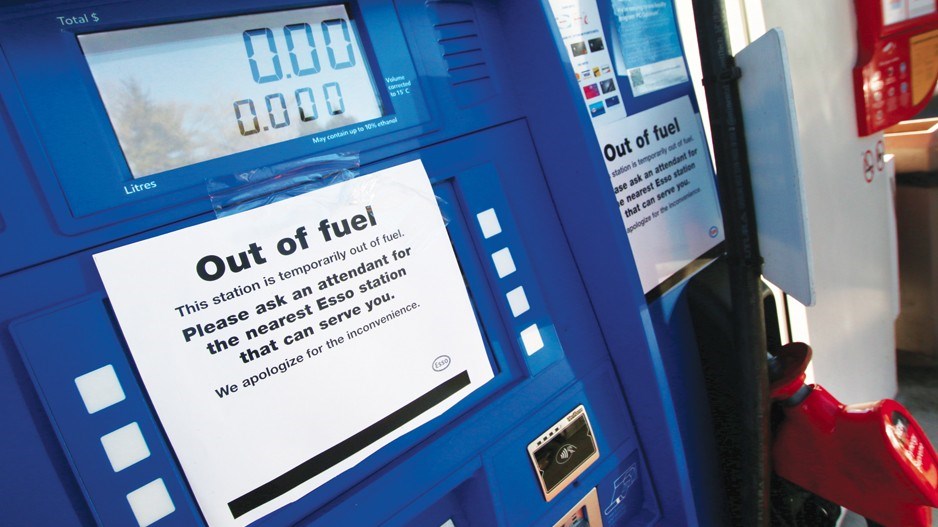Editor's note: A previous version of this story had stated Trans Mountain said it was restoring the pipeline to service by this week. In an update Monday, November 29, Trans Mountain said this had been delayed and was "still days away."
Trans Mountain Corp. last week said it hoped to have the pipeline that provides most of the oil, gasoline and diesel for southern B.C., as well as refineries in Washington state with crude oil, back in operation by now.
And Canadian National Railway (TSX:CNR), which can move oil or refined fuels by rail, had resumed some services as of last week.
But it could take a week or two before the Parkland Corp. (TSX:PKI) refinery in Burnaby is back in full production, one petroleum analyst predicted.
Oddly, though some gasoline stations in B.C. ran out of gas, gasoline prices did not spike in Metro Vancouver the way one might have expected.
Gas prices in Vancouver were averaging $1.60 per litre on November 15, when the three-day rainstorm that cut highways, rail lines and shut down the Trans Mountain pipeline ended.
On November 22, the day Parkland announced it was ceasing its refining operations because it was out of oil, gas prices in Vancouver fell by about $0.02 per litre, according to GasBuddy.
That may be partly because the B.C. government declared a state of emergency that limited gas purchases to 30 litres and prohibited retailers from “profit margin price gouging.” Also, the U.S. and several other countries agreed to release strategic petroleum reserves (SPR) to trying to curb escalating global oil prices.
And with the Lower Mainland cut off from the rest of B.C. due to flooded and damaged highways, there was a lot less driving going on and, therefore, less demand for gasoline.
“That is actually a silver lining here,” said Vijay Muralidharan, director of consulting for Kalibrate & Kent Group.
But the shutdown of the Trans Mountain pipeline and Burnaby refinery, and the severing of rail and highway links, raises questions about energy security. If rain can shut down a pipeline for more than two weeks – despite causing no actual physical damage to it – imagine what an earthquake might do.
Unlike the U.S., which keeps about 700 million barrels of oil as part of its SPR, Canada has no such reserves. It doesn’t need them, energy analysts say.
Most members of the International Energy Agency (IEA) are required to keep 90 days of oil for real emergencies, but Canada is exempt. So are other oil-exporting countries like Mexico and Norway.
“We have a reserve – the oilsands, and they can ramp up or down quickly,” said Dan McTeague, president of Canadians for Affordable Energy.
B.C. has some storage capacity, but it’s nowhere near the 90 days that IEA members with SPRs maintain.
Trans Mountain’s tank farm in Burnaby has 1.6 million barrels of storage – most of it for crude oil. That storage capacity will increase to 5.6 million barrels once the TMX expansion is completed.
The current storage capacity would have allowed the Parkland refinery to continue operating for a few days after the Trans Mountain pipeline shut down on November 14.
Should the pipeline be back online by now, it will take a few days before the refinery can ramp back up to full production, Muralidharan said.
“It depends on when Trans Mountain starts the pipeline. If they start, let’s say the end of this week or whatever the timeline is, I’d say 10 days to two weeks for full ramp-up.”
Trans Mountain last week said it hoped to have the pipeline back online by Sunday, but also warned that another deluge expected to hit B.C. could frustrate those plans.
“Key to successful execution of the restart plan will be access for equipment, fair weather and no new findings of concern,” the company said.
Parkland Fuels said it is keeping its refinery in ready mode. The refinery supplies about 30% of the Lower Mainland’s gasoline. The rest of the refined fuels consumed in the region come mostly from Alberta refineries through the Trans Mountain pipeline, which, as a batched pipeline, can move crude oil and refined fuels.
The pipeline also supplies Washington state refineries with crude oil, and those refineries sell some refined fuels back into B.C.
Gasoline has recently been barged to the Lower Mainland from the U.S., and rules were relaxed to allow Lower Mainlanders to skip across the U.S. border to buy gas without being subject to COVID-19 testing.
As for gasoline prices, they will likely rise in the coming weeks or months, as things get back to normal. American President Joe Biden’s decision to release 50 million barrels of oil from the U.S.A.’s SPR may have a temporary impact on oil prices, but Tu Nguyen, an economist with RSM Canada tax advisers, said it probably won’t last long.
“In the short-term, gas prices in Canada over the next week or two, might go down slightly by a few cents per litre,” she said. “In the long run, this is unlikely to have any meaningful impact on the oil industry.” •




